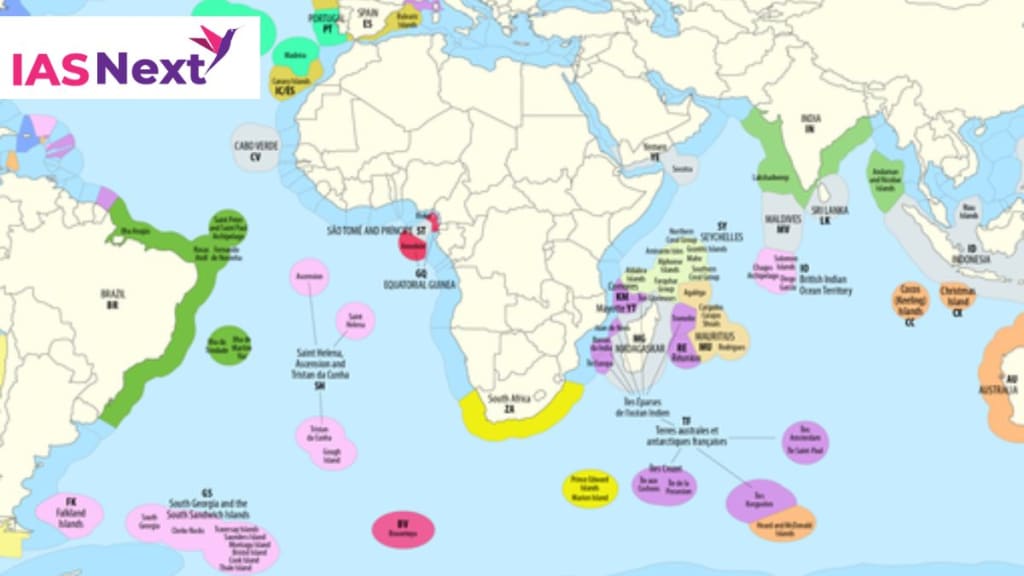Exclusive Economic Zone (EEZ)
IAS NEXT is a topmost Coaching Institute offering guidance for Civil & Judicial services like UPSC, State PCS, PCS-J exams since more than 10 years.

Introduction
Exclusive Economic Zone (EEZ) is comparatively a concept of recent origin. The concept of EEZ was initiated by Kenya in 1972 at the Geneva session of the UN Committee on Peaceful uses of Sea-bed and Ocean Floor Beyond the limits of National Jurisdiction. The EEZ finally found a place in the Convention on the Law of the Sea of 1982. Since then, it has become a generally accepted institution of the law of the sea. In Tunisia vs Libya, [ICJ Reports 1982 p. 18] it was stated that the concept of EEZ can be regarded as a part of customary laws.
The zone, in fact, has its roots in the concept of Exclusive Fishing Zone and the doctrine of the continental shelf. It was actuated by the developments that had taken place after the Second World War when many nations (particularly Latin American) started proclaiming 200 miles as their fishery zone. Such claims were motivated by a concern for the conservation of living sea resources and other considerations.
Meaning
Article 55 of the United Nations Convention on the Law of the Sea – Specific legal regime of the exclusive economic zone
The exclusive economic zone is an area beyond and adjacent to the territorial sea, subject to the specific legal regime established in this Part, under which the rights and jurisdiction of the coastal State and the rights and freedoms of other States are governed by the relevant provisions of this Convention.
It extends up to 200 nautical miles (equivalent to 370.4 km) from the baselines from which the breadth of the territorial sea is measured. [Article 57] The zone is an intermediate area between the high seas and the territorial sea with a distinct regime of its own which a State can specifically claim. The zone comprises the area which was previously part of the high seas and is not under the sovereignty of the coastal State.
Though the Convention refrains from describing EEZ as a part of the high seas, other State generally continues to exercise the freedoms of the high seas in the EEZ, in particular, freedoms of navigation and overflight, lying of submarine cables and pipelines and other internationally lawful uses of the sea related to these freedoms. But the Convention does not specify whether foreign warships, which enjoy the freedom of navigation through EEZ, can conduct naval exercises in the EEZ as they can on high seas.
Rights of the Coastal States over EEZ
In the EEZ, the Coastal States have ‘sovereign rights’ for the purpose of exploring and exploiting, conserving and managing the natural resources, living and non-living resources of the waters superjacent to the sea-bed and its subsoil.
Article 56 of the United Nations Convention on the Law of the Sea – Rights, jurisdiction and duties of the coastal State in the exclusive economic zone
In the exclusive economic zone, the coastal State has: (a) sovereign rights for the purpose of exploring and exploiting, conserving and managing the natural resources, whether living or non-living, of the waters superjacent to the seabed and of the seabed and its subsoil, and with regard to other activities for the economic exploitation and exploration of the zone, such as the production of energy from the water, currents and winds; (b) jurisdiction as provided for in the relevant provisions of this Convention with regard to: (i) the establishment and use of artificial islands, installations and structures;(ii) marine scientific research; (iii) the protection and preservation of the marine environment; (c) other rights and duties provided for in this Convention.....Read more
Read also: Territorial Sea – Meaning, Breadth And The Rights Of States
About the Creator
Enjoyed the story? Support the Creator.
Subscribe for free to receive all their stories in your feed. You could also pledge your support or give them a one-off tip, letting them know you appreciate their work.





Comments
There are no comments for this story
Be the first to respond and start the conversation.